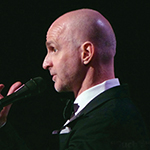Benn Bacot
Feinstein’s at the Nikko, San Francisco, CA, August 5, 2015
Reviewed by Steve Murray for Cabaret Scenes
 Benn Bacot, “The Bass of the Bay,” was in a celebratory mood throughout his performance of the music of the great Abbey Lincoln. He had just turned 58 the day before; Lincoln’s birthday would have been August 6, but foremost, Bacot was honoring the contributions his study of Lincoln have made to his life and style. Bass vocalists have been around forever, but only a few have had significant commercial success—one can think of Isaac Hayes, Johnny Cash, Lou Rawls, Leonard Cohen and Barry White. For me, the low resonance of the tones warms like a fine scotch, and Bacot sings with an authority and strength that make you believe each lyric.
Benn Bacot, “The Bass of the Bay,” was in a celebratory mood throughout his performance of the music of the great Abbey Lincoln. He had just turned 58 the day before; Lincoln’s birthday would have been August 6, but foremost, Bacot was honoring the contributions his study of Lincoln have made to his life and style. Bass vocalists have been around forever, but only a few have had significant commercial success—one can think of Isaac Hayes, Johnny Cash, Lou Rawls, Leonard Cohen and Barry White. For me, the low resonance of the tones warms like a fine scotch, and Bacot sings with an authority and strength that make you believe each lyric.
With Lincoln’s uniquely original music, he has a goldmine of opportunities to express his spirit, and his first trio of offerings excellently set the mood for the evening. Opening with “Living Room,” a song she co-wrote with husband/drummer/composer/bebop innovator Max Roach, Bacot and his band swing it in 4/4 time and you can feel Lincoln’s intention of allowing people the space they need to grow and nurture. Like Lincoln, Bacot believes in the magic inside people and it’s clearly evident in “The Music Is the Magic,” which sways to a Latin beat and creates magic through the excellent band led by Musical Director/pianist David Austin. Drummer Bob Blankenship and bassist Chuck Bennett fuel the rhythms supporting Bacot’s lovely interpretation. The gorgeous ballad “Bird Alone,” allows the singer to sink his teeth into a deeply emotional piece about being surrounded by life, but experiencing aloneness. Lovely horn melodies are supplied by Madeline Duran on sax and Rick Brown on trumpet.
Lincoln was an important early jazz innovator who developed into a socio-political artist and activist.
Her African Suite (“All Africa”/“Freedom Day”/“Africa”) was risky in its day, but set her on the path of Afro-centrism and jazz exploration. Bacot’s take on “Africa,” a vocalese Lincoln set to a John Coltrane instrumental, was nothing short of sensational.
Three of Lincoln’s major creations: the sublime “Throw It Away,” “Down Here Below” and “Should’a Been” featured Bacot’s range from baritone to low C. His expressive dramatic readings align wonderfully with Lincoln’s raw, honest philosophies. The arrangements, worked out between Bacot and Austin, are stellar.
Lincoln’s music allowed Bacot the opportunities to stretch his voice, dig deep into the very fabric of many emotions and front an excellent collection of jazz musicians. The symbiosis of Benn and Abbey’s spirits were forefront and palpable throughout this excellent show.





